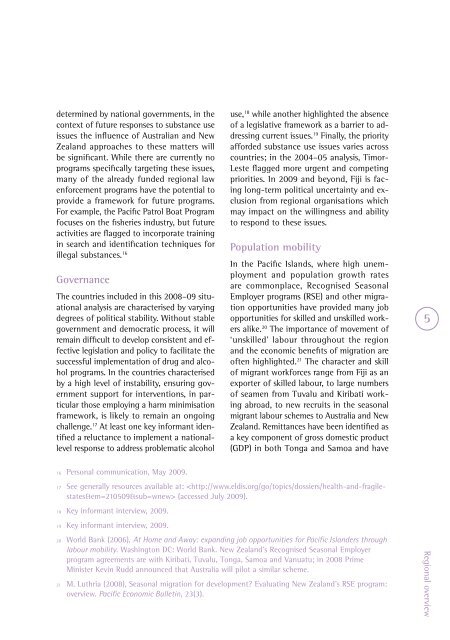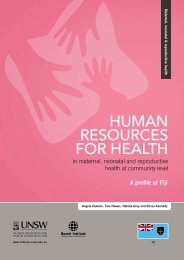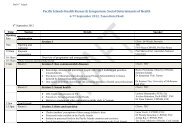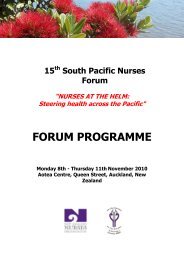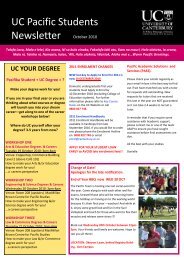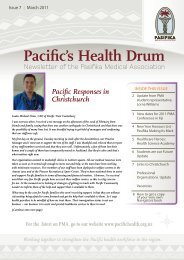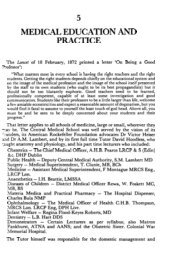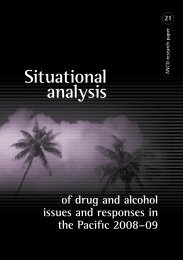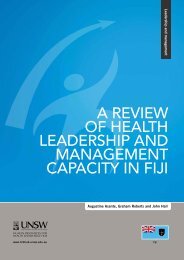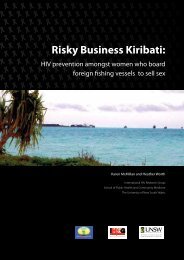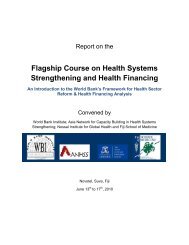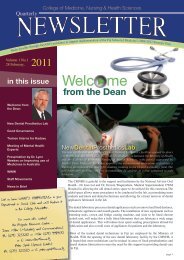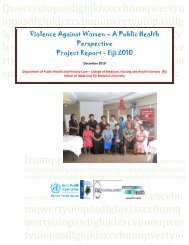rp21 situational analysis - Pacific Health Voices
rp21 situational analysis - Pacific Health Voices
rp21 situational analysis - Pacific Health Voices
Create successful ePaper yourself
Turn your PDF publications into a flip-book with our unique Google optimized e-Paper software.
determined by national governments, in the<br />
context of future responses to substance use<br />
issues the influence of Australian and New<br />
Zealand approaches to these matters will<br />
be significant. While there are currently no<br />
programs specifically targeting these issues,<br />
many of the already funded regional law<br />
enforcement programs have the potential to<br />
provide a framework for future programs.<br />
For example, the <strong>Pacific</strong> Patrol Boat Program<br />
focuses on the fisheries industry, but future<br />
activities are flagged to incorporate training<br />
in search and identification techniques for<br />
illegal substances. 16<br />
Governance<br />
The countries included in this 2008–09 <strong>situational</strong><br />
<strong>analysis</strong> are characterised by varying<br />
degrees of political stability. Without stable<br />
government and democratic process, it will<br />
remain difficult to develop consistent and effective<br />
legislation and policy to facilitate the<br />
successful implementation of drug and alcohol<br />
programs. In the countries characterised<br />
by a high level of instability, ensuring government<br />
support for interventions, in particular<br />
those employing a harm minimisation<br />
framework, is likely to remain an ongoing<br />
challenge. 17 At least one key informant identified<br />
a reluctance to implement a nationallevel<br />
response to address problematic alcohol<br />
use, 18 while another highlighted the absence<br />
of a legislative framework as a barrier to addressing<br />
current issues. 19 Finally, the priority<br />
afforded substance use issues varies across<br />
countries; in the 2004–05 <strong>analysis</strong>, Timor-<br />
Leste flagged more urgent and competing<br />
priorities. In 2009 and beyond, Fiji is facing<br />
long-term political uncertainty and exclusion<br />
from regional organisations which<br />
may impact on the willingness and ability<br />
to respond to these issues.<br />
Population mobility<br />
In the <strong>Pacific</strong> Islands, where high unemployment<br />
and population growth rates<br />
are commonplace, Recognised Seasonal<br />
Employer programs (RSE) and other migration<br />
opportunities have provided many job<br />
opportunities for skilled and unskilled workers<br />
alike. 20 The importance of movement of<br />
‘unskilled’ labour throughout the region<br />
and the economic benefits of migration are<br />
often highlighted. 21 The character and skill<br />
of migrant workforces range from Fiji as an<br />
exporter of skilled labour, to large numbers<br />
of seamen from Tuvalu and Kiribati working<br />
abroad, to new recruits in the seasonal<br />
migrant labour schemes to Australia and New<br />
Zealand. Remittances have been identified as<br />
a key component of gross domestic product<br />
(GDP) in both Tonga and Samoa and have<br />
5<br />
16 Personal communication, May 2009.<br />
17 See generally resources available at: <br />
(accessed July 2009).<br />
18 Key informant interview, 2009.<br />
19 Key informant interview, 2009.<br />
20 World Bank (2006), At Home and Away: expanding job opportunities for <strong>Pacific</strong> Islanders through<br />
labour mobility. Washington DC: World Bank. New Zealand’s Recognised Seasonal Employer<br />
program agreements are with Kiribati, Tuvalu, Tonga, Samoa and Vanuatu; in 2008 Prime<br />
Minister Kevin Rudd announced that Australia will pilot a similar scheme.<br />
21 M. Luthria (2008), Seasonal migration for development? Evaluating New Zealand’s RSE program:<br />
overview. <strong>Pacific</strong> Economic Bulletin, 23(3).<br />
Regional overview


